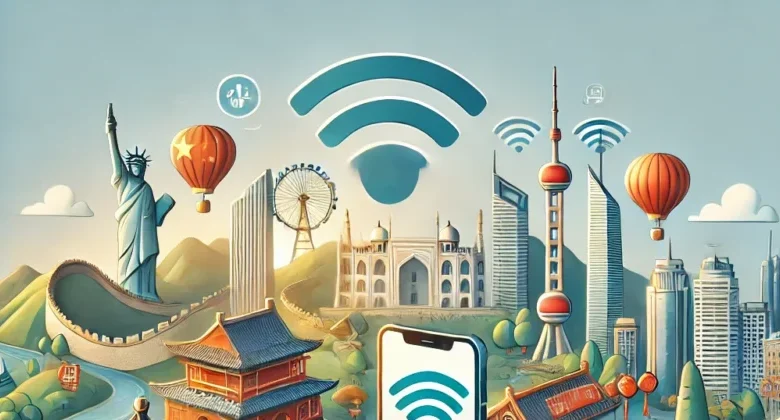What Are Some Common Myths About Traveling in China?

Are you thinking about traveling to China but feel overwhelmed by all the stories and
misconceptions you’ve heard? China is a country rich in culture, history, and stunning
landscapes, but it’s also surrounded by various myths that can leave travelers confused. How
do you separate fact from fiction when planning your trip? In this article, we will debunk some of
the most common myths about traveling in China and provide helpful insights for making the
most of your adventure.
You Can’t Stay Connected: Debunking the Connectivity Myth
One of the most common myths about traveling in China is that it’s impossible to stay connected
to the internet due to strict regulations. However, this is far from the truth. In fact, with a China
data eSIM, travelers can access local networks and enjoy seamless connectivity without the
need for physical SIM cards.
While it’s true that certain social media sites and apps may be restricted, there are plenty of
ways to stay connected while traveling through China. Many hotels, cafes, and public places
offer free Wi-Fi, and there are tools that help you access restricted sites if necessary. With the
right preparation, staying connected is easier than most people think, allowing you to share your
travel experiences and navigate with ease.
Language Barriers Are Impossible to Overcome
Another widespread myth is that the language barrier in China is too challenging for travelers
who don’t speak Mandarin. While it’s true that Mandarin is the official language and widely
spoken, many people in major cities like Beijing, Shanghai, and Guangzhou speak at least
some English, especially in tourist areas, hotels, and airports.
Additionally, thanks to modern technology, overcoming the language barrier is easier than ever.
Translation apps are incredibly helpful and widely used by travelers. You can quickly translate
text, signs, and even conversations with the help of these tools. Simple phrases in Mandarin
can also go a long way in enhancing your interactions with locals, and learning a few key
phrases will show respect and appreciation for the culture.
China Is Too Expensive to Travel
Many people believe that China is an expensive destination, but this myth is largely dependent
on how you plan your trip. While luxury hotels and fine dining can be pricey in major cities, there
are also plenty of budget-friendly options for accommodation, food, and transportation.
In fact, China is known for its affordable and delicious street food, which is available in nearly
every city and town. Public transportation, such as buses and the extensive high-speed rail
system, is also reasonably priced. If you’re traveling on a budget, China can be very affordable
without sacrificing quality experiences. Planning your trip with a mix of splurges and savings can
make your journey both memorable and budget-conscious.
Chinese Cities Are Overcrowded and Unmanageable
It’s no secret that China is home to some of the most populous cities in the world, and this can
make travelers hesitant about navigating large urban areas like Beijing and Shanghai. However,
while these cities are indeed bustling, they are also incredibly well-organized and designed to
accommodate large populations.
China’s public transportation systems are among the most efficient in the world, with high-speed
trains, subways, and buses that run frequently and are easy to navigate, even for first-time
visitors. Many cities also have clearly marked signs in both Chinese and English, making it
easier for tourists to get around. Although there may be crowds during peak travel seasons, the
well-structured systems and orderly flow of people in major cities ensure a smoother travel
experience than many anticipate.
You Can’t Explore China’s Remote Areas
Another common myth is that the remote and rural areas of China are too difficult for tourists to
access. While it’s true that China’s vast countryside may seem daunting, the reality is that
modern transportation infrastructure makes exploring rural areas much easier than before.
High-speed trains connect major cities to smaller towns and regions, and buses or guided tours
can take you even deeper into more remote areas. Popular destinations like the Karst
Mountains in Guilin or the Tibetan Plateau are accessible by train or flight, providing an
authentic experience of China’s diverse landscapes. For adventurous travelers, hiking in remote
mountain areas or exploring ancient villages is entirely possible with the right planning.
China Is Not Safe for Tourists
Safety is often a concern for travelers visiting any new country, and China is no exception.
However, China is generally a very safe destination for tourists, with low crime rates compared
to many other countries. Violent crime is rare, and petty crimes such as pickpocketing can be
avoided by taking standard precautions, such as keeping your belongings secure in crowded
areas.
Additionally, Chinese cities are well-patrolled, and there’s a strong presence of local authorities,
especially in tourist areas. Whether you’re exploring busy urban centers or remote villages,
common-sense safety practices will help ensure a worry-free experience. Many travelers find
that they feel safe walking around Chinese cities, even at night.
Conclusion
As we’ve seen, many of the myths about traveling in China are exaggerated or simply false.
With precautions like the China data esim, staying connected and navigating the country is easy
and stress-free. From overcoming language barriers to visiting remote areas, traveling in China
can be an enriching and smooth experience for those who plan ahead. By dispelling these
misconceptions, travelers can explore China with confidence and excitement. With the right
preparation, anyone can have a safe, affordable, and unforgettable adventure in this incredible
country.




